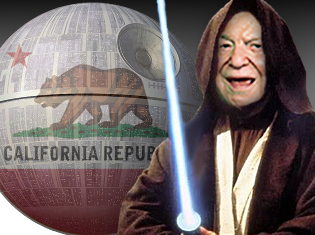 And so it was, late on Friday, that Sheldon ‘Obi-Wan’ Adelson suddenly looked as if he was about to faint. As he clutched onto the corner of his desk to keep himself upright, his personal assistant rushed to his side, asking what was wrong. Obi-Adelson replied: “I felt a great disturbance in the Force, as if millions of voices suddenly cried out in terror and were suddenly silenced. I fear something terrible has happened.”
And so it was, late on Friday, that Sheldon ‘Obi-Wan’ Adelson suddenly looked as if he was about to faint. As he clutched onto the corner of his desk to keep himself upright, his personal assistant rushed to his side, asking what was wrong. Obi-Adelson replied: “I felt a great disturbance in the Force, as if millions of voices suddenly cried out in terror and were suddenly silenced. I fear something terrible has happened.”
That something terrible – terrible for anti-online gambling zealot Adelson, at least – was the filing of not one but two online poker bills in the California legislature ahead of the deadline for consideration during the 2014 legislative session. Full text of the bills comes courtesy of OnlinePokerReport’s Chris Grove, who was the first to spot the Death Star beams aimed at Sheldon’s heart.
BILL LE UN
The first bill is AB 2291 (read it here), sponsored by Assemblyman Reggie Jones-Sawyer on behalf of a consortium of tribal groups including the Pechanga Band of Luiseño Indians. Eligible licensees include federally recognized California tribes and state card rooms, while the bill would “prohibit, among others, a federally recognized California Indian tribe that operates a gaming facility that accepts bets from players within the state but who are not physically present on Indian lands when making bets from operating an Internet poker Web site.”
As with its 2013 predecessor, AB 2291 would bar California from participating in any federal online poker program or entering into any liquidity sharing compacts with other states or foreign governments. Should California’s legislators violate this provision at some future date, licensees wouldn’t be required to pay the bill’s stipulated fees and all unused license fees already paid to the state would have to be refunded within 30 days.
AB 2291 calls for 10-year non-transferrable licenses with automatic renewals, but the number of licenses to be issued has yet to be determined. Approved licensees would submit a one-time fee of $5m, from which taxes would be deducted on a quarterly basis at a rate of 5% of gross gaming revenue. Applicants would have to prove they can get their hands on $5m in order for their application to be considered. Unspecified annual regulatory fees would also be imposed.
WIGGLE ROOM ON BAD ACTORS?
As befitting its ‘go it alone’ nature, AB 2291’s ‘bad actor’ provision is limited to subcontractors that took wagers from California residents rather than from any US resident. The bad actor prohibition extends to anyone who profited from such wagers, as well as brands, software, customer databases and any other data acquired, derived or developed directly or indirectly from any operation deemed to be wearing the scarlet letter.
However, the date used to determine what constitutes the taking of an illegal online wager – usually listed as anything after Dec. 31, 2006 – isn’t specified. Pechanga.net posted a cover letter addressed to tribal leaders that stated this and other “controversial sections” of the legislation – like the number of available licenses – had been intentionally left blank “as a demonstration of our commitment to continuing our good-faith efforts to reach tribal consensus through dialogue.”
AB 2291 would make it a crime to offer ‘electronic sweepstakes’ devices via internet cafés. Civil penalties levied against the operators of such establishments would help fund an Unlawful Gambling Enforcement Fund to help stamp out other unauthorized operators. On a smaller scale of criminality, registered players who allow anyone under the age of 21 to play on their account would be subject to an initial fine of between $1k-$2k, rising incrementally thereafter to $10k for a fifth or subsequent violation.
IS IT READY YET? HOW ABOUT NOW?
AB 2291 has been deemed an urgency statute, meaning it would take effect immediately upon passage by two-thirds of the legislature, and has been referred to the appropriation and fiscal committees. Regulations guiding online poker operations would need to be adopted within 270 days of the bill’s passage (hey, if New Jersey could do it…).
Assuming the bill passes, the regulations are adopted and licenses are issued before the end of the year, all licenses would take effect Jan. 1, 2015 (although this was the same date listed in the 2013 bill, so it’s either wildly optimistic or a typo). In case of delays, all licenses would take effect at some other designated start date.
BILL LE DEUX
The second bill, SB 1366 (read it here), is a retread of the SB 678 bill previously filed by Sen. Lou Correa, so if you’ve read our previous coverage, you need go no further. Basically, it would allow the state to opt in or out of any federal online poker framework and would permit interstate compacts. An unlimited number of licenses would be valid for 10-year terms and monthly taxes of 10% of gross gaming revenue would be deducted from initial one-off fees of $10m until that sum is exhausted and the licensee has to start writing monthly checks.
